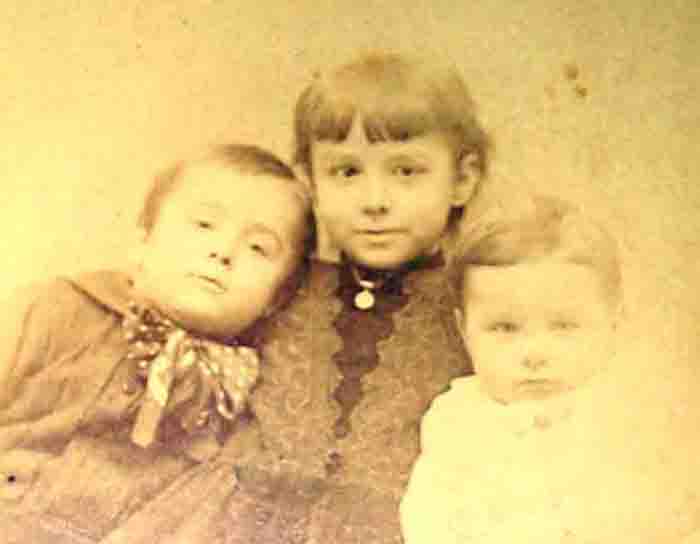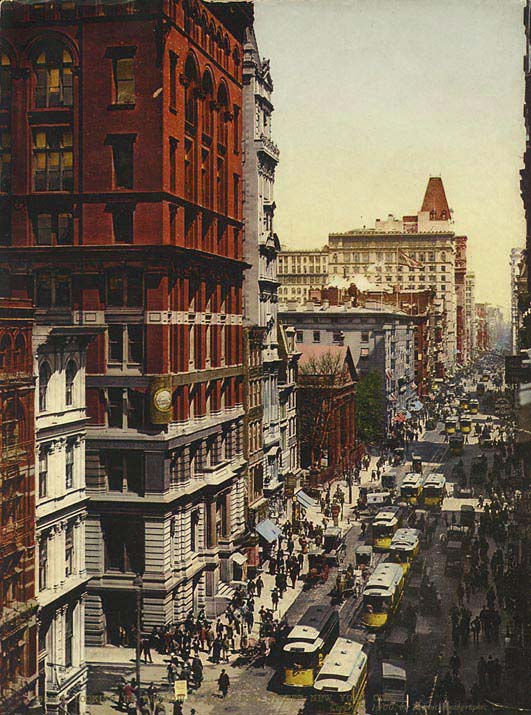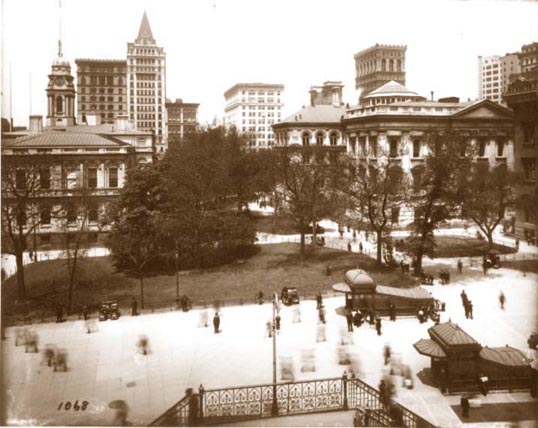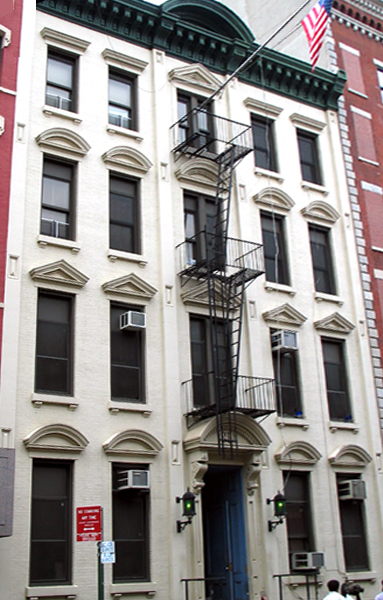 |
|
|
I'm not the first Smith to walk the streets of New York. This is a story about a walk my grandfather took in Manhattan 100 years ago. I've walked the route many times, and I always think about him when I'm down near City Hall. |

| The Smith children, left to right: Herbert, Ethel, Warren |
|
|
| |
| |
I
grew up in Albuquerque, but my grandfather, Warren
Smith, ('Pop") was from Brooklyn. He was born
in January 1888, in a house on the site of the present
day Williamsburg Bridge. Pop spoke authentic old-school
"Brooklynese". "These" and "those"
were "dese" and "dose", work was
"woik", and a toilet
was a "terlit". He was already in his eighties
when I was born, living on the east coast, and I never
got to know him well. One of the few times we met,
he started telling a story about being robbed when
he was a teenager. Grandma cut him off before he could
finish ("Oh, he's just telling that old story
again") but I knew the story anyway- it was a
family legend. |
|
|
Joseph B. Sargent
| Sargent Lock is still in business. In fact, you might have Sargent locks on your doors at home. They're also the official lock supplier for Habitat For Humanity |
|
|
In 1902, Pop started
working as an office boy for Sargent and Company,
a hardware manufacturer in downtown Manhattan- he was just fifteen at the time. By 1903, he was earning $4.00 a week. Pop always
said that Joseph ("Old Man") Sargent was an imposing figure. |
|
|
In March, 1903, another boy who worked for Sargent and Co., Joseph Cohen, age 21, was fired for "willful carelessness". Pop had never met Cohen, but he was quickly promoted to his old job. Every Saturday, one of his new duties was to pick up the weekly payroll and deliver it to the firm. At this time, Sargent and Co. employed over 130 employees, and the payroll averaged about $1,400. This was a lot of money for a teenage boy to be entrusted with- $1,400 is over $130,000 in 2005 dollars! Soon, Cohen's "willful carelessness" turned to pure maliciousness. He decided to rob Pop, possibly out of revenge for losing his job, but he doesn't seem to have had the courage or talent to do it alone. |
He met a couple of thugs in the Bowery (one newspaper said they met in an opium den, but I think they made that part up.) These guys had experience with this sort of thing, and Cohen asked them to help with the robbery. According to the New York Times, the men walked the same route that Pop always took when he was picking up the payroll. They noticed a vacant store, "the windows of which were so begrimed that nothing could be seen within." A rental agent gave them the key on the premise that they were interested in renting. They made a wax impression of the key, from which they made a duplicate copy. They now had free access to the store at any time. Their dastardly plan was falling into place.
|
Saturday, April 5th, 1903 was a cold and raw Saturday; there was even a passing snow flurry late in the morning. Around 9:30 A.M., Pop left Sargent and Co., and walked south about fifteen blocks to the Mercantile National Bank on Dey Street and Broadway. When the doors opened at 10:00, he was the second person in line. He withdrew the payroll all in small bills, ones, fives and tens, plus $35.00 in coins. It was so much money that he had to stuff the bills into every one of the pockets of his jacket and overcoat. "Thus loaded", he began his walk back to work.
|
|
|

Above: The Mercantile National Bank is the tall red building on the left, on the corner of Dey St. & Broadway, ca. 1900. The New York Times printed a minute-by-minute account of Pop's journey back to work: he left the bank around 10:10A.M., and walked north on Broadway, toward the top of this picture |
|
|

| Around 10:15 A.M., Pop continued north, from left to right in this picture, past City Hall. |
|
|
As he walked towards 60 Centre Street, three men came out on the sidewalk ahead of him. Before he knew what was happening, the men rushed at him, and crushed his hat down over his eyes. Warren was a "slight youth" and would have been no match against these three grown men. They hustled him up two stairs and into a room in the back of the dark store. One of the men grabbed his throat, and another "pounded him in the mouth by way of emphasis to a command to keep quiet." Then he aimed a pistol at him and said "If you make any noise, I'll blow your head off." The second man grabbed his arms and held them over his head while the third went through his pockets. Out came the wads of ones, fives and tens. They also took his empty wallet, which some friends had just bought him for his fifteenth birthday. "How much money did you withdraw?" Cohen asked Warren, who told him the amount. The payroll that week was slightly smaller than usual, and Cohen may have noticed that there weren't as many wads of bills. But he didn't stop to count, and in his hurry, he missed the quarters and dimes in the side pockets of the overcoat. Quickly the men began to tie Pop up. For his feet they used an old roller towel, and for his hands, a blue bordered handkerchief. Before leaving, the gunman said "If you make any noise for ten minutes, you are a dead one. If you know what's good for yourself, you'll keep still."
Then they were gone. After recovering from his fright, Pop quickly freed himself from the knots and ran the few blocks to Sargent and Co.
|
|
| |
(above) Centre Street looking south. I believe Pop was robbed in one of the buidings on the left. |
|
|
 |
|
| Of all of the places where these events took place, only the police Station of Elizabeth Street survives. The bank, the abandoned storefront, Sargent and Co., are all gone. I visited the station one day, and a cop on duty let me into the room where pop would have been interviewed that day- it really hasn't changed much. A gas fireplace burned in the corner, pictures of turn-of-the-century policemen in their tall helmets hung on the walls. It was quite an experience. |
| |
| It speaks well of Pop's character that the firm had trusted him to carry the cash in the first place, but consider that, when Warren came back empty-handed, they immediately believed his story. The bruises on his face probably helped to corroborate his truthfulness. |
| |
| The police arrested Joseph Cohen almost right away, but it was almost a year before the other two men were
caught. One was nabbed on a street corner in the East Village, the other was tackled on a platform at Grand Central as he tried to pull a gun on detectives. |
|
| |
|
Pop had to pick the men out of a lineup. When he chose the right men, the policemen all broke into applause. One newspaper called him a "keen-eyed lad". All of the men got long prison sentences in Attica Prison. |
| |
| All of the New York newspapers wrote about this story, and even a few in Washington D.C. and Philadelphia. I'm really grateful to have those articles- they've given me an invaluable snapshot of what my grandfather's life was like at that time. |
|
|
Warren Sale Smith |
| |
| |
|
|
|
|
 |
|

